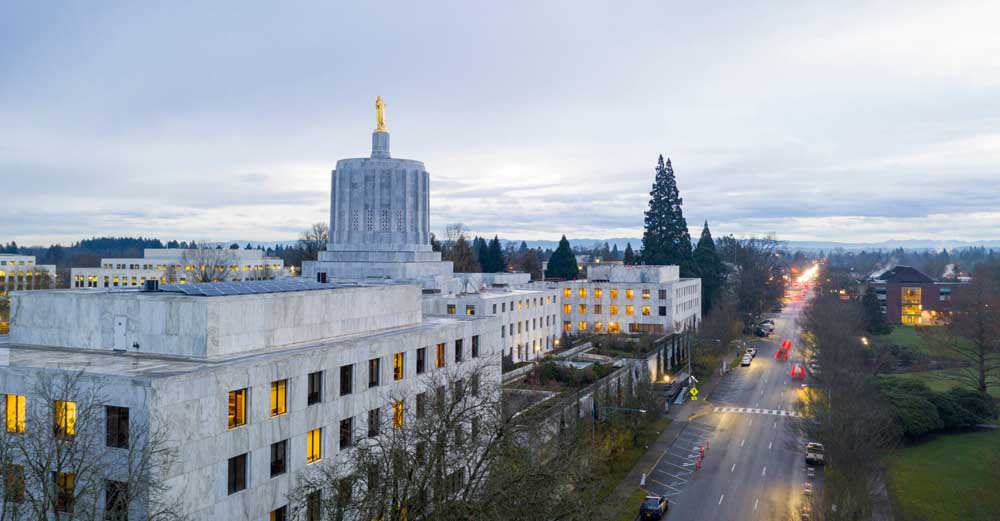Going nuclear in Umatilla County
Published 5:00 am Wednesday, May 28, 2025

- House Bill 2410 in the 2025 Oregon Legislature would allow the state Energy Facility Siting Council to grant a site certificate for a small modular nuclear reactor demonstration project in Umatilla County. (East Oregonian, File)
Growth spurs Umatilla County to push for use of small modular reactor, but the idea won’t go anywhere unless local voters approve it
Oregon House Bill 2410 would allow the state Energy Facility Siting Council to grant a site certificate for a small modular nuclear reactor demonstration project in the county. A small modular reactor is a scaled-down version of a nuclear reactor that can be assembled and then
transported to a specific location. It generates less power than a traditional nuclear power plant.
The bill traces its roots to a growing need by area officials to find an environmentally-friendly power source to fuel the county’s growing industry – such as data centers – while also furnishing electricity for more traditional uses like agriculture.
“I’m in full support of it. We need more power in the county, and we need clean power, and it doesn’t get any cleaner than nuclear power,” said Umatilla County Board of Commissioners Chair John Shafer.
HB 2410 also calls for a series of other steps, including a requirement by the Energy Facility Siting Council to coordinate with Indian tribes regarding the feasibility of the project. The bill also directs the state Department of Energy and other state agencies to craft a report regarding rules and laws pertinent to small modular reactors.
The state Energy Facility Siting Council is the department responsible for reviewing and accepting the installation of large energy projects in Oregon. The legislation refers the bill “to the people of Umatilla County for their approval or rejection at the next regular general election.” The bill’s main sponsors are Rep. Bobby Levy, R-Echo, Rep. Ed Diehl, R-Scio, and Sen. David Brock Smith, R-Port Orford.
The bill now sits in the Legislature’s Joint Committee on Ways and Means after it cleared the House Climate, Energy and Environment Committee. A public hearing on the bill by the House Climate, Energy and Environment Committee in February produced testimony from more than 125 people, with many of them opposed to the proposed legislation.
Another piece of legislation tied to nuclear energy — Senate Bill 635 — is before the Senate Energy and Environment Committee. That bill tasks Oregon State University to craft a feasibility study regarding the possibility of opening more nuclear power generation in Oregon.
In 1980, Oregon voters passed Ballot Measure 7, which stipulated that before any new nuclear facility was built in the state there must be a certified, stable facility to dispose of radioactive waste. The measure also required that any new nuclear plant be approved through a statewide vote. Nuclear power “is the way to go,” Levy said.
“I firmly believe new, small modular reactors are safe,” she said.

Levy
A nuclear reactor controls nuclear fission reaction to produce steam to drive turbines linked to generators to create electricity. The U.S. Nuclear Regulatory Commission Nuclear oversees power plants — big and small.
Supporters of nuclear power cite its environmentally clean footprint — nuclear power produces no greenhouse gas emissions — and that it is safer than fossil fuels in terms of health.
Critics cite the vulnerability of nuclear power plants to accidents — such as a meltdown of the reactor core — which can contaminate the environment with radiation.
Opponents to nuclear power also point to the production of radioactive waste as a problem and the potential of a nuclear power plant disrupting vulnerable ecosystems. According to the U.S. Department of Energy, small modular reactors are safer, cheaper to build and, because of their size, ideal for “small electrical markets, isolated areas, smaller grids, sites with limited water and acreage, or unique industrial applications.”
Education remains key goal
Levy said a great deal of fear is attached to nuclear power. She said she believes her job now is to educate residents on its benefits.
“I want people to have a say and to listen to facts, not just fearmongering. I want everyone informed with the truth, not fear,” she said.
Dan Dorran, Umatilla County commissioner, said a small modular reactor is the first step toward solving a potential problem regarding the electrical needs of existing and new industry in the region. He said officials began to search for alternatives and clean sources of energy nearly two years ago. That’s because, he said, the area continues to grow, not only in terms of industry but also in terms of new residents.

Dorran
“We looked at everything, from natural gas, which has its own challenges in Oregon, to hydrogen. I attended several hydrogen conferences but, again, it is an electrical generation that uses carbon,” he said.
Dorran said Umatilla County traditionally adopted a proactive approach to securing sources of electricity.
“I thought it was incumbent on us to make sure we were participating in the discovery of solutions. Energy is a need Umatilla County will have deep into the future. So, we started on a journey trying to find a path to both carbon zero and true, foundational baseload energy,” he said.
Dorran said other forms of renewable energy — such as solar — are a “tough path forward because they are intermittent.”
Dorran said the journey “took us to the small modular reactors.”
“We visited with folks in the Tri-Cities, visited with folks from the DOE (Department of Energy) from Washington, D.C. The journey led us to the most reasonable path forward,” he said.
Dorran said the small modular nuclear reactor concept is one that will take time.
“You are looking at a long-term path, anywhere from five to 10 years with the permitting and regulatory process,” he said.
Shafer said a small modular reactor could potentially be a safeguard for power generation as more industry, including data centers, move into the county.
“That is one of the concerns of the data centers, that they are using so much power and they have to upgrade the system and that will cause electricity rates to rise,” he said.

Shafer
Data centers locally mean Amazon. The massive, Seattle-based company announced last fall it plans to link up with Energy Northwest, a confederation of utility firms from Washington state, to study a proposal for small modular reactors in the Richland area. The purpose of the reactors will be to power Amazon’s seven current data centers in Umatilla and Morrow counties. Amazon also aims to construct new data centers near Arlington.
Dorran said the county’s idea for a small modular reactor isn’t connected to Amazon’s efforts.
“Amazon is an industrial user (of power) in Umatilla County but so are a lot of others. We have a lot of high-energy load users,” said Dorran. Dorran said Amazon “has truly had no influence on this at all.”
“We are helping Umatilla County. Amazon is a partner with us just like Lamb Weston or the Casino,” he said.
Dorran also said more power will be needed for major distribution centers — such as FedEx and United Parcel Service – already in the county.
Dorran said officials also reviewed Ballot Measure 7.
“There was a lot of misconception about that proposal. It wasn’t a constitutional change, it was a statutory change. So, after looking at it we thought there might be a path, albeit narrow, to begin looking at small modular nuclear reactors to help generate power in Umatilla County,” he said.
Dorran said the county does not plan to operate or own a small modular nuclear reactor if one is built. Instead, he said it would be privately owned.
“Umatilla County’s place is we identify property, we identify roads, and the normal infrastructure steps a county does for economic development,” he said.
Dorran also said the county already has the type of workforce needed to operate a modular reactor.
“All of the workforce from Hanford is very much transferable to Umatilla County,” he said.
Hot-button issue
The legislation triggered plenty of feedback during the House Climate, Energy and Environment Committee hearing in February.
Testimony clearly drew a demarcation line between those who support the legislation and those who do not.
Dorran said officials have had “a lot of conversations with individual and largescale opposition groups.”
“We are not shying away from having conversations with the opposition. That is how we are able to sharpen our story and present our technology,” he said.
He said, for example, some who oppose the small modular reactor idea compare it to nuclear technology used at Hanford.
The comparison isn’t accurate because they are “two very different technologies and usage,” Dorran said.
“But we are having good conversations. That is the important part of this, to be able to have legit conversations,” he said.
One key player in any discussion about a small modular nuclear reactor in the county is the Confederated Tribes of the Umatilla Indian Reservation near Pendleton. As of now, the tribes are opposed to the idea.
Lisa Ganuelas, Lisa Ganuelas, CTUIR board member at large, submitted testimony at the House Climate, Energy and Environment Committee hearing. She wrote the tribes “have significant concerns regarding House Bill 2410.”
Ganuelas wrote CTUIR remained in the shadow of the Hanford Nuclear Facility clean-up efforts.
“Hanford was sited in our territory without concern for our treaty reserved rights and, as an ‘affected tribe’ CTUIR has been involved in the clean-up at Hanford for decades,” she wrote.
The Handford Nuclear Reservation remains an active clean-up site managed by the Department of Energy.
Ganuelas wrote that House Bill 2410 “does not provide a long-term solution regarding any nuclear waste generated and shifts the burden for temporary storage of spent nuclear fuel or radioactive by-products generated by the demonstration project to an unknown Nuclear Regulatory Commission License.”
Ganuelas wrote the Confederated Tribes may support studies of a small modular nuclear reactor’s feasibility so long “as those studies include tribal consultation and allow for robust input from Tribal governments, so we can identify potential impacts to our homeland, resources and rights and so long as the studies require explicit consideration for long-term disposal of wastes generated.”
“We’ve had several and continuing conversations with the tribe. The tribes are very deliberate in their research and the information they gather,” Dorran said.
Levy said the tribes are a crucial part of the discussion regarding a small modular nuclear reactor.
“In no way, shape or form will we do something that they don’t have a say in, especially when it comes to nuclear energy. They are a vital part of our community and our economy,” Levy said.
Ultimately, the bill stipulates the final word on the proposal would come from county voters. That’s how it should be, said Shafer.
“I always think voters should have a say. I honestly didn’t think it would get this far. It is a hot button issue and our Legislature kind of steers away from those,” he said.





